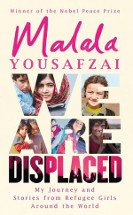We are displaced by Malala Yousafzai

Hachette, 2019. ISBN 9781474610049
(Age: 12+) Highly recommended. Non-fiction.
Nobel Prize winner and campaigner for every girl's right to complete
12 years of free, safe and quality education, Malala Yousafzai
presents not only a short version of her own story in this new
publication, but has gathered together the stories of many brave
refugee girls she has met in the years following the attack on her
by the Taliban. Her aim is to help people understand the enormity of
the current refugee crisis, the biggest refugee crisis in history,
and to hear the stories of the people caught in it, ordinary people
caught in conflict and forced to leave their homes, choosing life
over death.
The refugee stories are gathered from around the world: Yemen,
Syria, Iraq, Colombia, Guatemala, the Congo, Myanmar, Uganda. The
stories are quite short but oh so powerful! The first tells of
Zaynab and Sabreen, two teenage sisters, who fled the bombs in Yemen
and travelled to Egypt to apply through the US Embassy to be
reunited with their mother who had already reached safety in the
United States. Zaynab, the eighteen year old, was granted refugee
status. Her sister, sixteen, was inexplicably, senselessly,
rejected, and left on her own. Zaynab was able to fly to Minneapolis
and undertake college education. Sabreen was left to risk her life
on a boat with other refugees crossing the Mediterranean to Italy.
The different fates of the two girls were cast by a careless and
cruel administrative decision.
Marie Claire's family fled the Congo, running from wild militia
groups terrorising the country. Marie Claire saw her father stabbed
in the head, and her mother brutally murdered, sacrificing herself
to save her children. Marie Claire and her extended family were
lucky to be approved by UNHCR to go to Pennsylvania, and be welcomed
by Jennifer, a warm-hearted volunteer with a refugee support
organisation.
There are other stories, of young girls in desperate situations,
seeking refuge and determined, like Malala, to build a better
future. They are sad but also inspiring stories, of people who if
just given a chance, are able to rise up to achieve their dreams.
The coloured photographs of each of the girls reinforce that these
are real people, who just by the chance of the place they were born,
have had to deal with the most terrible life circumstances. Their
stories reveal that they are also very strong, independent and
determined people deserving of our admiration.
Proceeds from We are displaced go to the Malala Fund for girls'
education. But the message of the book is that we can all help, not
only by donating money, but by educating ourselves about the refugee
situation, giving time and attention, having empathy, and being kind
to someone who has been displaced.
Helen Eddy